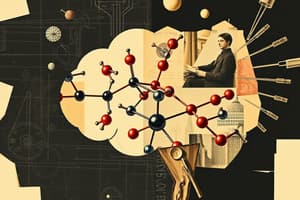Podcast
Questions and Answers
What are catecholamines primarily classified as?
What are catecholamines primarily classified as?
- Nitrogenous bases
- Fatty acids
- Peptides
- Biologically active amines (correct)
Which of the following is NOT a catecholamine?
Which of the following is NOT a catecholamine?
- Dopamine
- Norepinephrine
- Epinephrine
- Serotonin (correct)
Where are epinephrine and norepinephrine synthesized?
Where are epinephrine and norepinephrine synthesized?
- Pancreas
- Liver
- Adrenal medulla (correct)
- Thyroid gland
What role do catecholamines primarily play in the body?
What role do catecholamines primarily play in the body?
Which of the following amino acids is a precursor for catecholamine synthesis?
Which of the following amino acids is a precursor for catecholamine synthesis?
Which enzyme is the rate-limiting step in the synthesis of norepinephrine?
Which enzyme is the rate-limiting step in the synthesis of norepinephrine?
Which of the following factors negatively affect the activity of Tyrosine Hydroxylase?
Which of the following factors negatively affect the activity of Tyrosine Hydroxylase?
What is the cofactor required by DOPA Decarboxylase?
What is the cofactor required by DOPA Decarboxylase?
Which compound is formed from the action of Dopamine Beta-Hydroxylase?
Which compound is formed from the action of Dopamine Beta-Hydroxylase?
Which of the following is required for the activity of Phenylethanolamine N-Methyltransferase?
Which of the following is required for the activity of Phenylethanolamine N-Methyltransferase?
What is the primary physiological function of norepinephrine?
What is the primary physiological function of norepinephrine?
What type of enzymatic activity does Tyrosine Hydroxylase exhibit?
What type of enzymatic activity does Tyrosine Hydroxylase exhibit?
Which vitamin is a key component in the regeneration of tetrahydrobiopterin?
Which vitamin is a key component in the regeneration of tetrahydrobiopterin?
What compound is the direct precursor for norepinephrine synthesis?
What compound is the direct precursor for norepinephrine synthesis?
Which enzyme is responsible for converting DOPA into dopamine?
Which enzyme is responsible for converting DOPA into dopamine?
What is the primary biochemical precursor for both carnosine and anserine?
What is the primary biochemical precursor for both carnosine and anserine?
Which of the following statements about creatine is true?
Which of the following statements about creatine is true?
Which amino acid is involved in the formation of anserine from carnosine?
Which amino acid is involved in the formation of anserine from carnosine?
Where is carnosine abundantly found in the body?
Where is carnosine abundantly found in the body?
What is a defining characteristic of anserine in humans?
What is a defining characteristic of anserine in humans?
What is the function of iodinated thyroglobulin in the thyroid follicles?
What is the function of iodinated thyroglobulin in the thyroid follicles?
Which statement accurately describes T3 and its formation?
Which statement accurately describes T3 and its formation?
What is the primary physiological role of serotonin?
What is the primary physiological role of serotonin?
Where is the largest amount of serotonin found in the body?
Where is the largest amount of serotonin found in the body?
Which enzyme is crucial for serotonin synthesis?
Which enzyme is crucial for serotonin synthesis?
What is the precursor for the neurotransmitter GABA?
What is the precursor for the neurotransmitter GABA?
Which statement is true regarding the functions of histidine?
Which statement is true regarding the functions of histidine?
Which of the following correctly describes the main locations of serotonin-synthesizing neurons?
Which of the following correctly describes the main locations of serotonin-synthesizing neurons?
Which substance is required as a reductant in the catalyzation process?
Which substance is required as a reductant in the catalyzation process?
What is decarboxylation primarily responsible for producing in this context?
What is decarboxylation primarily responsible for producing in this context?
Which of the following is NOT listed as a clinical application of agents that interfere with histamine action?
Which of the following is NOT listed as a clinical application of agents that interfere with histamine action?
Which process leads to the degradation of 5-hydroxytryptophan?
Which process leads to the degradation of 5-hydroxytryptophan?
What role does histamine play in allergic reactions?
What role does histamine play in allergic reactions?
Which of the following is a chemical messenger that mediates cellular responses?
Which of the following is a chemical messenger that mediates cellular responses?
What type of cell secretes histamine in response to allergic reactions?
What type of cell secretes histamine in response to allergic reactions?
Which of the following cellular responses is NOT associated with histamine?
Which of the following cellular responses is NOT associated with histamine?
Flashcards are hidden until you start studying
Study Notes
CATECHOLAMINES
- Biologically active amines include dopamine, norepinephrine, and epinephrine, functioning mainly as neurotransmitters in the brain and autonomic nervous system (ANS).
- Catecholamines offer crucial physiological roles, serving as building blocks for proteins and precursors for various nitrogen-containing compounds.
- They play significant roles in regulating carbohydrate and lipid metabolism, responding to stressors like fright or exercise, and increasing cardiac output and blood pressure.
SYNTHESIS
-
Tyrosine Hydroxylase:
- Rate-limiting step, acts as a mixed-function oxidase, abundant in central nervous system, sympathetic ganglia, and adrenal medulla.
- Allosteric enzyme with negative effectors including dopamine, norepinephrine, and epinephrine; utilizes Tetrahydrobiopterin as a cofactor, with NADPH involved in regeneration.
-
DOPA Decarboxylase:
- Pyridoxal phosphate-dependent enzyme that converts dopa to dopamine.
-
Dopamine Beta-Hydroxylase:
- Copper-containing enzyme responsible for forming norepinephrine; requires ascorbate and molecular oxygen.
-
Phenylethanolamine N-Methyltransferase:
- Located in the adrenal medulla; converts norepinephrine to epinephrine, induced by glucocorticoids and inhibited by epinephrine itself.
DEGRADATION
- Tyrosine residues iodinated to form monoiodotyrosine and diiodotyrosine, which participate in the synthesis of T3 and T4.
- Iodinated thyroglobulin is stored in thyroid follicles and hydrolyzed to release T3 and T4 into circulation; T3 is more active than T4 and binds to nuclear receptors.
GLUTAMATE
- Precursor of gamma-aminobutyric acid (GABA), the primary inhibitory neurotransmitter in the brain and spinal cord.
- GABA is metabolized in neurons to succinate, bypassing the α-ketoglutarate dehydrogenase step of the TCA cycle.
TRYPTOPHAN
- Precursor to serotonin, melatonin, and nicotinamide-adenine dinucleotide (NAD+).
- Serotonin primarily produced in intestinal mucosal cells and has roles in pain perception, behavioral regulation, sleep, temperature control, and vasoconstriction.
- Synthesized by neurons in the hypothalamus, brain stem, and pineal gland, with tryptophan hydroxylase catalyzing the rate-limiting step.
HISTIDINE
- Precursor of histamine, which functions as a potent vasodilator and neurotransmitter.
- Histamine mediates various biological responses, including allergic and inflammatory reactions, gastric acid secretion, and neurotransmission.
- Stored in granules with ATP and degraded by monoamine oxidase (MAO).
CREATINE AND PHOSPHOCREATINE
- Found in muscles; specific functions are not well-defined, but they are involved in energy metabolism.
- Creatine is derived from histidine and β-alanine, leading to the formation of carnosine present in specific brain areas and absent in cardiac muscles.
- Anserine is formed through methylation of carnosine by S-adenosylmethionine and is not found in human skeletal muscles.
Studying That Suits You
Use AI to generate personalized quizzes and flashcards to suit your learning preferences.




